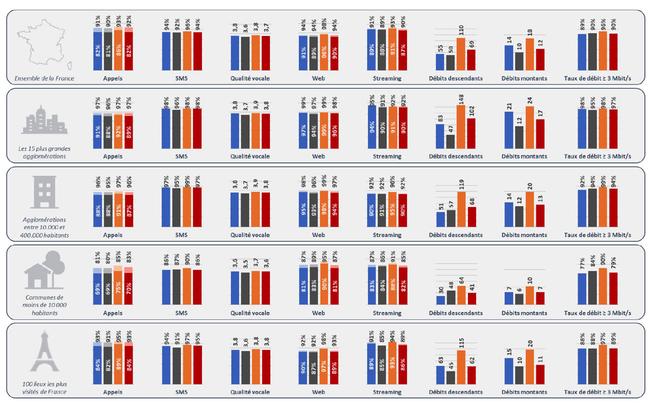ARCEP publishes the results of its 22nd campaign to measure the quality of mobile services.For the first time, the telecommunications regulatory authority puts 5G networks to the test, inside and outside the buildings as in transport.The "largest 5G network in France" is also the slowest, while Orange comforts its fastest and reliable operator's place in the country.
Thus for the eleventh consecutive year, the historic operator displays the best results, reaching 366 of the 403 criteria measured.Orange offers the best quality of service for voice as well as for data, in dense areas such as intermediate or rural areas, on the road as on the train.The first operator in France offers the best average speed: 110 Mbit/s, against 69 Mbit/s for SFR, 55 Mbit/s for Bouygues Telecom, and 50 Mbit/s for Free.
This first place "constitutes a great pride for Orange and its teams which work daily and tirelessly to the deployment of networks", explains Fabienne Dulac, Deputy Director of Orange France.Jean-Paul Arzel, network director of Bouygues Telecom, welcomes a network "dimensioned to provide excellent quality of service in all circumstances to our customers".
The third operator in number of customers confirms its place as Dauphin in terms of quality, leading to 50 of the 403 criteria measured, and taking 208 times second place.Bouygues can be proud to win the palm of the 5G hook rate in the dense zone, a figure which represents the share of the flow tests actually performed in 5G, measured for the first time this year.

After marking the plunge in 2020, the average speed exploded this year, reaching 95 Mbit/s in dense areas, against 74 Mbit/s in the intermediate zones and 47 Mbit/s in rural areas.Orange stands out as the operator of cities and Free like that of the fields: the fourth operator offers the second best average speed and the best hook rate of 5G in rural areas.
Free ensures that these results "come to validate the deployment strategy of our mobile network in France" and presents itself as "the first alternative operator on low dense areas".The fact remains that the Télécom's troublemaker displays the worst average debit in 5G, which will not fail to relaunch the debate on the "real" and the "false" 5G.
Alors que le débit moyen augmente chez tous les opérateurs dans toutes les zones1 dès lors que l’on prend en compte les mesures réalisées en 5G, celui de Free baisse ! Le réseau de Free s’impose comme le plus lent de France, avec un débit moyen de 31 Mbit/s, contre 142 Mbit/s chez Orange, avec une pointe à 227 Mbit/s dans les zones denses.
SFR, suffering From the indicators of quality of service, is the cherry in terms of flows.The Red Square Operator offers an average speed of 84 Mbit/s throughout the territory, and 145 Mbit/s in dense areas, figures that "highlight the solid performance of SFR networks" according to Altice.
Conversely, Bouygues offers the best grip rate, but an average flow slightly lower at 71 Mbit/s throughout France and 130 Mbit/s in dense areas.Orange and Bouygues are distinguished with the best blanket on the roads and on the railways, but the differences are gradually tightening.
Introduced last year, the share of flow tests exceeding 3 Mbit/s is a good indicator of the homogeneity of the country's scale coverage.This share is particularly high in the densest areas, with tight results, turning between 94 % and 99 % depending on operators.
The gap is more marked in rural areas: Orange displays a rate of 90 %, compared to 84 % for Free, and 77 % for the other two operators.But all operators combined, this figure increases by eight points, and shows the investments made to cover these less dense areas.
Gently but surely, the quality gap between cities and fields is reduced.The "my mobile network" tool will allow you to consult the coverage and the quality of the networks near you. Les données de l’Arcep sont mises à disposition sur le site data.gouv.Fr.
With the exception of the average speed offered by SFR in the intermediate zones, which goes from 68 Mbit/s in 2G/3G/4G to 66 Mbit/s in 2G/3G/4G/5G.↩︎
Medical deserts, public services: what assessment of Macron on rurality?
The best phones in 2021 for photos and video
What is the best Oppo smartphone to choose?
Good Plan: the recap of 4G packages on sale